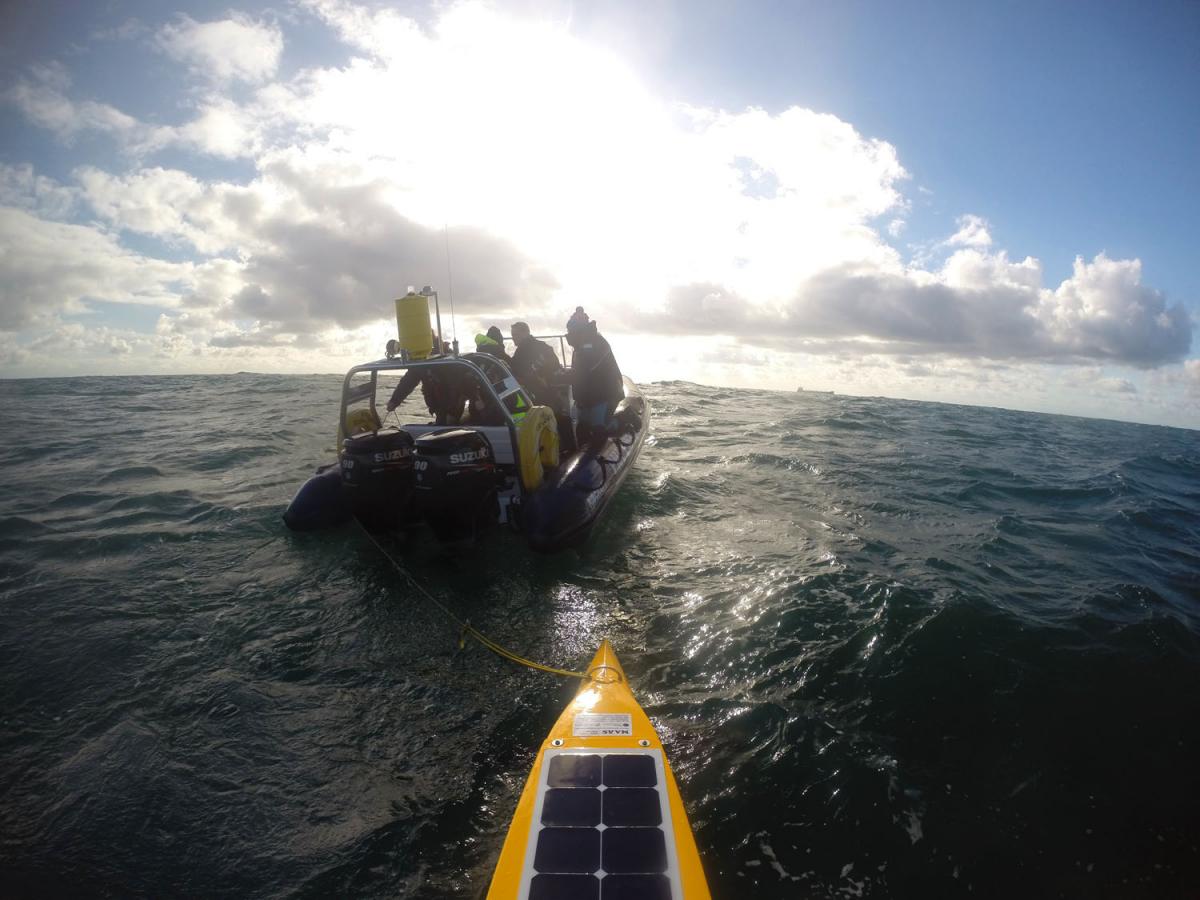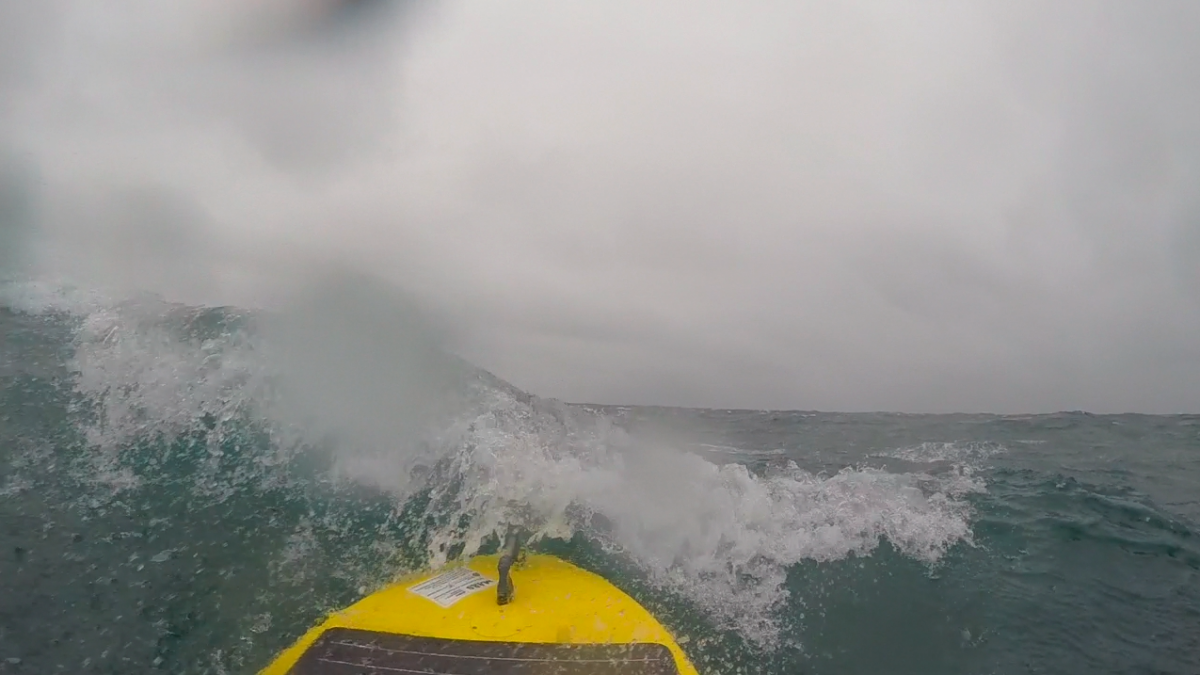Robot fleet successfully completes pioneering mission
The second phase of an ambitious project to gather valuable information on ocean processes and marine life using a fleet of innovative marine robots has just reached its conclusion. Co-ordinated by the National Oceanography Centre (NOC), the Exploring Ocean Fronts project took place off southwest England and saw the largest deployment of robotic vehicles ever attempted in UK waters.
The marine robots, which are powered by a combination of wave, wind and solar power, are controlled by satellite communications and can cover hundreds of kilometres in a single mission.
 In the latest phase of the project, three unmanned surface vehicles were used to track fish carrying acoustic ‘pingers’ off the Devon coast. About 85 fish, including rays, sole and plaice, were tagged and released by scientists from the Marine Biological Association (MBA), with the aim of understanding how these fish use Marine Protected Areas. The roaming robotic vehicles carried acoustic receivers and worked alongside a series of fixed receivers on the seabed in order to track fish movements inside and outside of the protected sites.
In the latest phase of the project, three unmanned surface vehicles were used to track fish carrying acoustic ‘pingers’ off the Devon coast. About 85 fish, including rays, sole and plaice, were tagged and released by scientists from the Marine Biological Association (MBA), with the aim of understanding how these fish use Marine Protected Areas. The roaming robotic vehicles carried acoustic receivers and worked alongside a series of fixed receivers on the seabed in order to track fish movements inside and outside of the protected sites.
Commenting on the fish-tracking trial, Professor David Sims of the MBA said: “The patrolling robots successfully located tagged fish, and also tracked the movements of individual fish over several days by re-locating them. This demonstrates the potential of ocean robots for monitoring dynamic changes in distributions of commercially important fish, which will underpin effective management and understanding of climate change impacts”.
The surface vehicles were also carrying camera systems that successfully imaged a variety of marine wildlife, including porpoises and gannets. It is the first time images of marine life have been captured by NOC’s robotic vehicles operating far from land and demonstrates huge potential for surveying parts of the ocean that are rarely visited by research ships.
 Phase one of the project saw the robot fleet head up to 150 kilometres offshore from the Isles of Scilly over a two-week period. Despite having to cope with a series of autumn storms, the fleet continued to collect high-quality data that have provided valuable insights into the effect that stormy weather has on ocean processes and marine life. Head of NOC’s Marine Autonomous Robotics Systems group, Dr Maaten Furlong said: “These missions have demonstrated the ability of these new vehicles to travel hundreds of kilometres in very demanding conditions. Although some of the vehicles were impacted by the bad weather, it provided us with the opportunity to gain experience of piloting in harsh conditions”.
Phase one of the project saw the robot fleet head up to 150 kilometres offshore from the Isles of Scilly over a two-week period. Despite having to cope with a series of autumn storms, the fleet continued to collect high-quality data that have provided valuable insights into the effect that stormy weather has on ocean processes and marine life. Head of NOC’s Marine Autonomous Robotics Systems group, Dr Maaten Furlong said: “These missions have demonstrated the ability of these new vehicles to travel hundreds of kilometres in very demanding conditions. Although some of the vehicles were impacted by the bad weather, it provided us with the opportunity to gain experience of piloting in harsh conditions”.
The pioneering trials were co-ordinated by the National Oceanography Centre, in partnership with 20 other organisations representing the marine robotics industry, research organisations, and marine data users such as the UK Met Office and the Royal Navy. Dr Russell Wynn of NOC, who was the scientific co-ordinator of the project, said: “Overall the project has been hugely successful and we have collected a huge amount of valuable scientific and engineering data. By working in partnership and sharing our resources and expertise we have developed a strong UK community in marine robotic operations, and we are already planning further joint missions in the near future”.
Notes to Editors
Further details about the Exploring Ocean Fronts project can be found on the project website: https://projects.noc.ac.uk/massmo
For more information, email communications@noc.ac.uk or call the NOC Press Office on +44(0)23 8059 6170. NOC has a studio with an ISDN line for radio interviews.
The project was co-ordinated by the National Oceanography Centre, in partnership with:
ASV, Cefas, Defence Science and Technology Laboratory, Defra, Liquid Robotics, Marine Biological Association, MOST (Autonomous Vessels) Ltd, Plymouth Marine Laboratory, Royal Navy, RS Aqua, Sea Mammal Research Unit, Teledyne Webb, UK Met Office, University of Exeter
-
The National Oceanography Centre (NOC) is the UK’s leading institution for integrated coastal and deep ocean research. NOC undertakes and facilitates world-class agenda-setting scientific research to understand the global ocean by solving challenging multidisciplinary, large scale, long-term marine science problems to underpin international and UK public policy, business and wider society outcomes.
NOC operates the Royal Research Ships James Cook and Discovery and develops technology for coastal and deep ocean research. Working with its partners NOC provides long-term marine science capability including: sustained ocean observing, mapping and surveying; data management and scientific advice.
NOC operates at two sites, Southampton and Liverpool, with the headquarters based in Southampton.
Among the resources that NOC provides on behalf of the UK are the British Oceanographic Data Centre (BODC), the Marine Autonomous and Robotic Systems (MARS) facility, the National Tide and Sea Level Facility (NTSLF), the Permanent Service for Mean Sea Level (PSMSL) and British Ocean Sediment Core Research Facility (BOSCORF). The National Oceanography Centre is wholly owned by the Natural Environment Research Council (NERC).
- The Marine Biological Association (MBA) is a professional body for marine scientists with some 1,400 members world-wide. Since 1884 the MBA has established itself as a leading marine biological research organization contributing to the work of several Nobel Laureates and over 170 Fellows of the Royal Society. In 2013, the MBA was awarded a Royal Charter in recognition of its long and eminent history and its status within the field of marine biology. The award strengthens the Association’s role in promoting marine biology as a discipline and in representing the interests of the marine biological community.
